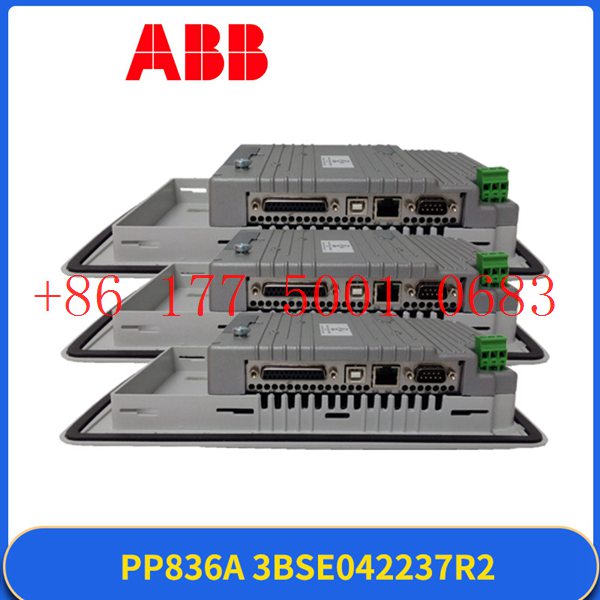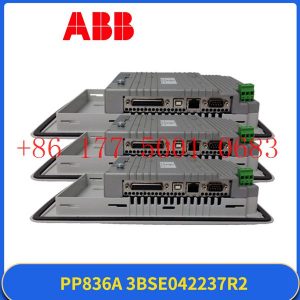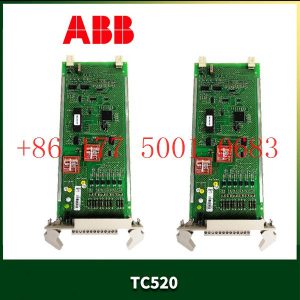Description
hardware flow control. It is an ideal choice in the field of industrial automation.
How does ABB robot multi-task? Detailed steps on how to use ABB robot multitasking
1.ABB robots support multi-tasking (each robot body can support up to one motion task).
2. To use multi-tasking, the robot must have the 623-1 mulTItasking option
3. How to create a new multi-task?
4. Control panel, configuration
5.Theme controller
6. Enter the task and create a new one
At this time, it must be set to normal, otherwise programming cannot be performed. After all programming and debugging are completed, set it back to
semi staTIc and it will start running automatically.
7. Restart
8. The program editor enters t2 task.
9. How to transfer data between multiple tasks? The following takes the bool amount flag1 transferred between tasks as an example (that is, if any task
modifies the flag1 value, the flag1 value of the other task is also modified)
10. Both the front-end and the back-end must create data. The storage type must be a variable with the same type and the same name, for example:
Pers bool flag1
That is to say, both tasks must have this flag1, and it must be a variable variable.
11. In t2, the code is as follows
12. The foreground task code is as follows
The above can realize the background task to scan the di_0 signal in real time. If the di_0 signal changes to 1, flag1 is true. According to logic, the front
desk waits for flag1 to be true. After executing waituntil, set flag1 to false
13. How to run?
Click on the bottom one in the lower right corner of the teach pendant, make sure both tasks are checked, and then run it. You can test it.
14. There is no problem in the test. Enter the configuration interface, change t2 to semi staTIc, and restart. At this time, t2 cannot be selected and it has started
running automatically.
Analysis of ABB Robot Simulation Technology
The competitive pressure in the industrial automation market is increasing day by day, and customers are demanding higher efficiency in production to
reduce prices and improve quality. Spending time testing or commissioning a new product at the beginning of a new product is not feasible today because it would
mean stopping existing production to program the new or modified part. ABB”s RobotStudio is built on ABB VirtualController. We can use it to easily simulate the
on-site production process on the computer, allowing customers to understand the development and organization of the production process.
robotstudio features:
1. CAD import
RobotStudio can easily import data in various mainstream CAD formats, including IGES, S TE P, VRML, VDAFS, ACIS and CA TI A, etc. Robot
programmers can use these precise data to program robots with higher accuracy, thus improving product quality.
2. Automatic path generation
One of the most time-saving features in RobotStudio. By using a CAD model of the part to be processed, this function can automatically
generate the robot position (path) needed to track the machining curve in just a few minutes, a task that would normally take hours or even days.
3. Program editor
The program editor (Program Maker ) can generate robot programs, allowing users to develop or maintain robot programs offline in
a Windows environment, which can significantly shorten programming time and improve program structure.
4. Path optimization
The Simulation Monitor is a visual tool for robot motion optimization, with red lines showing where improvements can be
made to make the robot operate in the most efficient way.
5. Automatically analyze stretching ability
Users can use this function to move the robot or workpiece arbitrarily until all positions are accessible, and the work
cell floor plan verification and optimization can be completed within minutes.
6. Collision detection
Collision detection function can avoid serious damage caused by equipment collision. After selecting detection objects,
RobotStudio can automatically monitor and display whether these objects will collide when the program is executed.
7. Online homework
Use RobotStudio to connect and communicate with real robots, and perform convenient monitoring, program modification,
parameter setting, file transfer, backup and recovery operations on the robot.
Excitation system ABB module DSRF182AK02 3BSE014078R1
Excitation system ABB module DSRF182
Excitation system ABB module DSRF180M
Excitation system ABB module DSRF180A 57310255-AV
Excitation system ABB module DSRF180A
Excitation system ABB module DSRF160M
Excitation system ABB module DSRF160
Excitation system ABB module DSRF154M
Excitation system ABB module DSRF150
Excitation system ABB module DSRC113
Excitation system ABB module DSRB310
Excitation system ABB module DSRB110
Excitation system ABB module DSQT239
Excitation system ABB module DSQS118
Excitation system ABB module DSQC697
Excitation system ABB module DSQC697
Excitation system ABB module DSQC679 3HAC028357-001
Excitation system ABB module DSQC679 3HAC028357-001
Excitation system ABB module DSQC679
Excitation system ABB module DSQC679
Excitation system ABB module DSQC668 3HAC029157-001
Excitation system ABB module DSQC668
Excitation system ABB module DSQC664
Excitation system ABB module DSQC663 3HAC0298180881
Excitation system ABB module DSQC663 3HAC029818-001/14
Excitation system ABB module DSQC663 3HAC029818-001
Excitation system ABB module DSQC663
Excitation system ABB module DSQC661 3HAC026253-001
Excitation system ABB module DSQC661
Excitation system ABB module DSQC659
Excitation system ABB module DSQC658
Excitation system ABB module DSQC658
Excitation system ABB module DSQC653
Excitation system ABB module DSQC652 3HNA025917-001
Excitation system ABB module DSQC652
Excitation system ABB module DSQC651
Excitation system ABB module DSQC643 3HAC024488-001
Excitation system ABB module DSQC639 3HAC025097-001
Excitation system ABB module DSQC639
Excitation system ABB module DSQC639
Excitation system ABB module DSQC633
Excitation system ABB module DSQC627 3HAC020466-001
Excitation system ABB module DSQC627 3HAC020466-001
Excitation system ABB module DSQC627
Excitation system ABB module DSQC626A
Excitation system ABB module DSQC626
Excitation system ABB module DSQC626
Excitation system ABB module DSQC611
Excitation system ABB module DSQC611
Excitation system ABB module DSQC609
Excitation system ABB module DSQC609
Excitation system ABB module DSQC608
Excitation system ABB module DSQC608
Excitation system ABB module DSQC604
Excitation system ABB module DSQC604
Excitation system ABB module DSQC603
Excitation system ABB module DSQC602
Excitation system ABB module DSQC602
Excitation system ABB module DSQC601 3HAC12815-1
Excitation system ABB module DSQC601
Excitation system ABB module DSQC572
Excitation system ABB module DSQC562 3HAC16014-1/05
Excitation system ABB module DSQC546A
Excitation system ABB module DSQC545A 3HAB8101-19/07A







Reviews
There are no reviews yet.